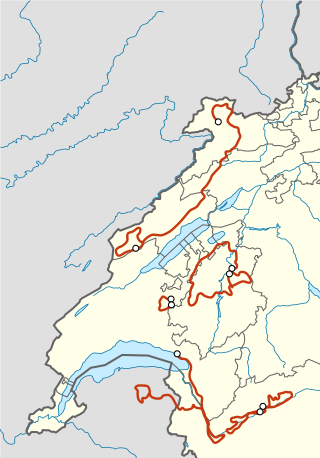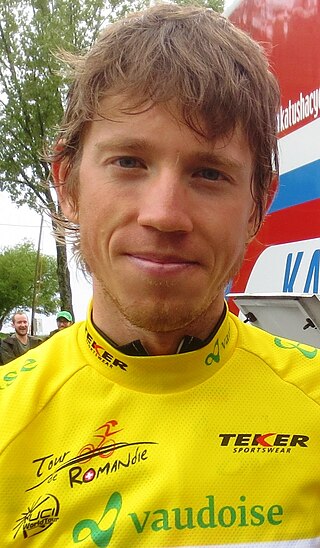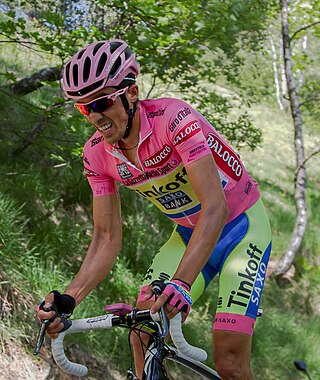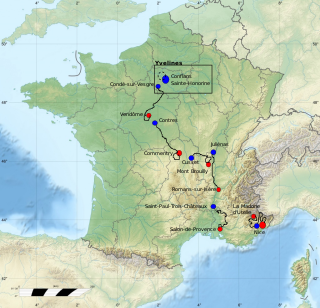
The 2013 Tour de France was the 100th edition of the Tour de France, one of cycling's Grand Tours. It started on the island of Corsica on 29 June and finished on the Champs-Élysées in Paris on 21 July. The Tour consisted of twenty-one stages and covered a total distance of 3,403.5 km (2,115 mi). The overall general classification was won by Chris Froome of Team Sky. Second and third respectively were Nairo Quintana and the Team Katusha rider Joaquim Rodríguez.

The 2010 Tour de Romandie cycling road race started on 27 April and finished on 2 May in Switzerland. It was the 6th event in the 2010 UCI ProTour, and the 13th event in the World Calendar. The race winner had been declared as Alejandro Valverde, who won the final stage to take the race by 11 seconds. However, some four weeks after the end of the race the UCI placed Valverde under a two-year suspension for his involvement in the 2006 Operación Puerto doping case, which was backdated to, and involved removal of all his results since, 1 January 2010. Simon Špilak was thus promoted to winner of the event.

The 2014 Giro d'Italia was the 97th running of the Giro d'Italia, one of cycling's Grand Tour races.
The 2014 Tour de Romandie was the 68th running of the Tour de Romandie cycling stage race. The race consisted of six stages, beginning with a prologue stage in Ascona on 29 April and concluding with another individual time trial, in Neuchâtel, on 4 May. It was the fourteenth race of the 2014 UCI World Tour season.

Ilnur Azatovich Zakarin is a Russian former racing cyclist, who competed as a professional from 2012 to 2022.

The 2015 Giro d'Italia was a three-week Grand Tour cycling stage race that took place in May 2015. It was the 98th running of the Giro d'Italia and took place principally in Italy, although some stages visited France and Switzerland. The 3,481.8-kilometre (2,163.5 mi) race included 21 stages, beginning in San Lorenzo al Mare on 9 May and concluding in Milan on 31 May. It was the fifteenth race of the 2015 UCI World Tour. The Giro was won by Alberto Contador (Tinkoff–Saxo), with Fabio Aru (Astana) second and Aru's teammate Mikel Landa third.

The 2016 Tour de France was the 103rd edition of the Tour de France, one of cycling's Grand Tours. The 3,529 km (2,193 mi)-long race consisted of 21 stages, starting on 2 July in Mont Saint-Michel, Normandy, and concluding on 24 July with the Champs-Élysées stage in Paris. A total of 198 riders from 22 teams entered the race. The overall general classification was won by Chris Froome of Team Sky, with the second and third places were taken by Romain Bardet and Nairo Quintana, respectively.
The 2015 Tour de Romandie was the 69th edition of the Tour de Romandie stage race. It took place from 28 April to 3 May and was the fourteenth race of the 2015 UCI World Tour. The race took place around the Romandy region of Switzerland, starting in Lac de Joux and finishing in Lausanne. The race included six stages, with a team time trial at the beginning and an individual time trial at the end with four hilly or mountainous stages in between. The queen stage was the fifth stage, which finished on the climb above Champex.

The 2016 Giro d'Italia was the 99th edition of the Giro d'Italia, one of cycling's Grand Tour races. The Giro started in Apeldoorn on 6 May with a 9.8 km (6 mi) individual time trial, followed by two other stages in the Netherlands, both between Nijmegen and Arnhem. After a rest day, there were 18 further stages to reach the finish on 29 May. These stages were principally in Italy, although two stages partly took place in France.

The 2016 Paris–Nice was a road cycling stage race that took place in France between 6 and 13 March 2016. It was the 74th edition of the Paris–Nice and was the second event of the 2016 UCI World Tour.
The 2016 Tour of the Basque Country was a road cycling stage race that took place in the Basque Country between 4 and 9 April 2016. It was the 56th edition of the Tour of the Basque Country and the ninth event of the 2016 UCI World Tour.

The 2017 Tour de France was the 104th edition of the Tour de France, one of cycling's Grand Tours. The 21-stage race took place across 3,540 km (2,200 mi), commencing with an individual time trial in Düsseldorf, Germany on 1 July, and concluding with the Champs-Élysées stage in Paris on 23 July. A total of 198 riders from 22 teams entered the race. The overall general classification won by Chris Froome of Team Sky, his third consecutive victory and fourth overall. Rigoberto Urán (Cannondale–Drapac) and Romain Bardet finished second and third, respectively.
The 2016 Volta a Catalunya was a road cycling stage race that took place in Catalonia, Spain, from 21 to 27 March. It was the fifth race of the 2016 UCI World Tour and the 96th edition of the Volta a Catalunya.

The 2017 Giro d'Italia was the 100th edition of the Giro d'Italia, one of cycling's Grand Tour races. The race started on 5 May in Alghero on the island of Sardinia, and ended on 28 May in Milan. The race was won by Tom Dumoulin, who became the first Dutch male winner of the Giro.
The 2017 Abu Dhabi Tour was a road cycling stage race that took place between 23 and 26 February. It was the third edition of the Abu Dhabi Tour and was the third event of the 2017 UCI World Tour. It was the first time that the race was included in the UCI World Tour calendar.
The 2017 Tour de Romandie was a road cycling stage race that took place between 25 and 30 April in Romandie, Switzerland. It was the 71st edition of the Tour de Romandie and the nineteenth event of the 2017 UCI World Tour.

The 2019 Tour de France was the 106th edition of the Tour de France, one of cycling's three Grand Tours. The 3,365.8 km (2,091 mi)-long race consisted of 21 stages, starting in the Belgian capital of Brussels on 6 July, before moving throughout France and concluding on the Champs-Élysées in Paris on 28 July. A total of 176 riders from 22 teams participated in the race. The overall general classification was won for the first time by a Latin American rider, Egan Bernal of Team Ineos. His teammate and 2018 Tour winner Geraint Thomas finished second while Steven Kruijswijk came in third.
The 2018 Tour of the Basque Country was a road cycling stage race that took place between 2 and 7 April 2018 in Spain. It was the 58th edition of the Tour of the Basque Country and the fourteenth event of the 2018 UCI World Tour.

The 2020 Tour de France was the 107th edition of the Tour de France, one of cycling's three Grand Tours. Originally scheduled to start on 27 June 2020, it was postponed until 29 August 2020 due to the COVID-19 pandemic in France. The race began in Nice on 29 August and concluded with its traditional run on the Champs-Élysées on 20 September. A total of 176 riders from 22 teams participated in the race. The overall general classification was won for the first time by a Slovenian, Tadej Pogačar of UAE Team Emirates. His fellow countryman Primož Roglič finished second, while Australian Richie Porte (Trek–Segafredo) came third.

The 2020 Tour de France was the 107th edition of the Tour de France, one of cycling's Grand Tours. The Tour began in Nice with a hilly stage on 29 August, and Stage 11 occurred on 9 September with a flat stage to Poitiers. The race finished on the Champs-Élysées in Paris on 20 September.











